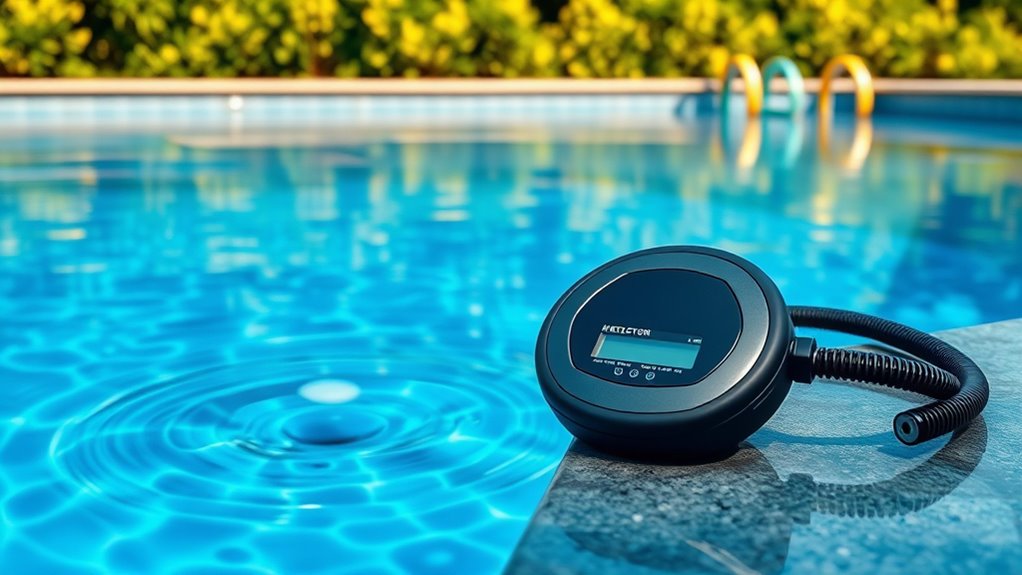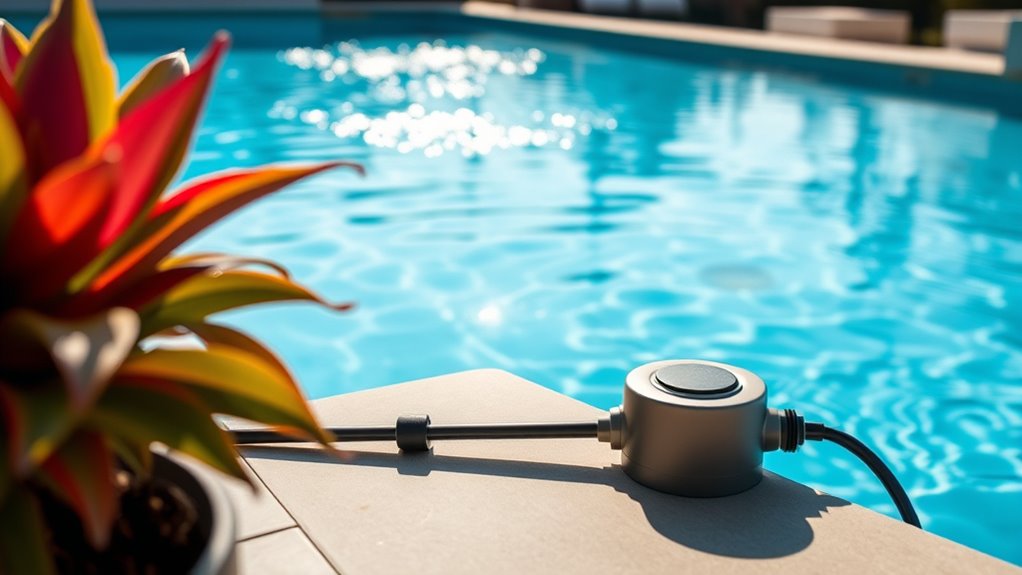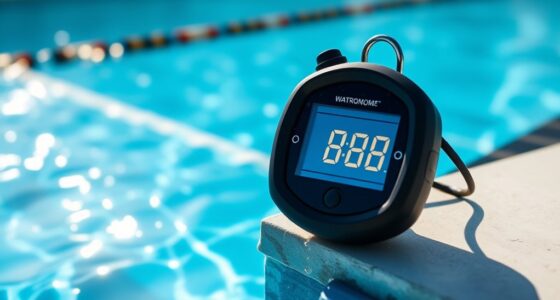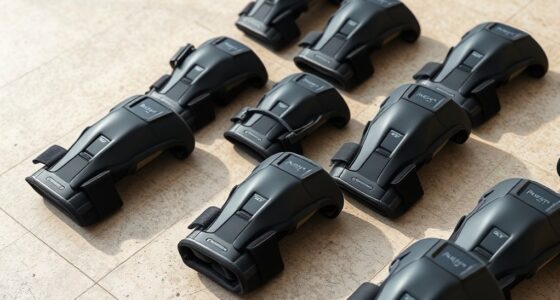Pool leak detectors use innovative methods to pinpoint leaks effectively. They harness underwater microphones to amplify leak sounds or introduce low-voltage currents to identify disruptions in the flow. Dye testing allows technicians to visually trace any leaks, while monitoring water levels offers a straightforward approach to spot trouble over time. Pressure testing is the go-to for plumbing leaks, ensuring accuracy without invasive measures. Curious about the best method for your pool? Keep exploring to find out more!
Key Takeaways
- Acoustic leak detection uses underwater microphones to amplify sounds associated with leaks, allowing for quick identification.
- The electrical current technique detects leaks in vinyl liners by monitoring disruptions in flow caused by low-voltage currents.
- Dye testing visually confirms leaks by injecting safe dye near suspected areas and tracing its movement.
- Water level monitoring involves marking and observing water levels over time to identify potential leaks in the pool shell or plumbing.
- Plumbing leak detection utilizes pressure testing to identify underground pipe issues by monitoring pressure drops in pressurized systems.

Detecting leaks in your pool can save you time and money, and there are several effective methods to do it. One of the most innovative approaches to leak detection involves underwater microphones. These devices amplify sounds associated with leaks, helping you pinpoint the exact location of the problem quickly.
Another method is the electrical current technique, especially useful for vinyl liners. By introducing a low-voltage current into the water, a sensor detects any disruptions in the flow, indicating a leak’s presence.
Dye testing is another reliable method you can use. By injecting a safe, non-toxic dye near suspected leaks, you can visually trace its movement. If the dye gets drawn towards an opening, you’ll know there’s a leak. This method works particularly well in areas with slow water circulation.
Additionally, marking your pool’s water levels can help you identify whether the leaks are in the pool shell or plumbing. By monitoring drops in water levels over time, you can gather vital information.
Advanced acoustic leak detection methods use sound waves and vibrations to identify leaks without the need for extensive digging. Underwater listening devices act like sensitive microphones, amplifying the sounds of escaping water. Tools like the LT-1000, equipped with high-powered amplifiers, enhance sound accuracy and filter out ambient noise, allowing you to spot leaks efficiently, often in under an hour.
Plus, many technicians can stay dry while using these acoustic tools.
When it comes to plumbing leaks, pressure testing is the go-to method. This technique involves pressurizing the pipes and monitoring for drops in pressure, which indicate leaks. It’s incredibly effective for underground pipes but usually requires specialized equipment and expert knowledge.
Although more complex than other methods, it’s a highly reliable way to detect plumbing issues.
Electronic leak detection devices are another game-changer. These advanced tools use sound waves or vibrations to locate leaks with impressive precision and speed. While they may come with a higher price tag, their non-invasive nature minimizes the need for disruptive digging, making them suitable for both residential and commercial pool maintenance.
Frequently Asked Questions
How Often Should I Check for Pool Leaks?
You should check for pool leaks regularly to catch any issues early.
Aim for weekly checks during peak usage times, especially in hot weather when evaporation rates rise.
Keep an eye on water levels daily to spot any unusual drops.
If you have an auto-fill system, monitor it closely—constant running could mean a leak.
Being proactive helps prevent costly repairs and keeps your pool in great shape, ensuring everyone enjoys it safely.
Can I Use a Pool Leak Detector for Above-Ground Pools?
Can you really use a pool leak detector for above-ground pools? Absolutely!
While these detectors are mainly designed for inground pools, you can adapt them for above-ground ones with some modifications.
It’s essential to understand your pool’s structure, as the thinner liners may require careful handling.
Using sound-based devices or dye tests can help you pinpoint leaks effectively, saving you money on unnecessary repairs and ensuring your pool stays in great shape.
What Is the Cost of a Pool Leak Detection Service?
The cost of a pool leak detection service can vary considerably, typically ranging from $100 to $1,000.
On average, you can expect to pay around $300, with full services, including pressure and dye testing, costing about $395.
Factors like the type and size of your pool, along with any complex features, influence these costs.
Investing in professional services can save you money in the long run by preventing further water loss and damage.
Are There DIY Methods for Detecting Pool Leaks?
Are you worried about a potential leak in your pool? There are several DIY methods you can try.
The bucket test helps determine if water loss is due to evaporation or a leak. You can also use a dye test to locate leaks around fittings.
A simple visual inspection can reveal wet spots or cracks. These methods are cost-effective and accessible, allowing you to take charge of your pool maintenance without professional help.
How Do Weather Conditions Affect Leak Detection Accuracy?
Weather conditions greatly affect leak detection accuracy.
If you’re in a humid area, moisture can corrode your equipment, leading to false readings.
In windy climates, evaporation rates rise, making it tough to differentiate between normal water loss and leaks.
Heavy rainfall might expose hidden leaks, but it can also obscure them under increased pressure.
Adapting your detection methods to suit the current weather will help you spot leaks more effectively and maintain your pool’s integrity.
Conclusion
Just like a watchful guardian in a fairytale, pool leak detectors tirelessly patrol the waters, ensuring your oasis remains intact. They reveal hidden troubles beneath the surface, much like a wise sage uncovering truths. By heeding their warnings, you protect not just your pool, but also the joy and memories it holds. Embrace these vigilant allies, and you’ll find peace of mind, knowing your aquatic haven is secure against the whispers of unseen leaks.









